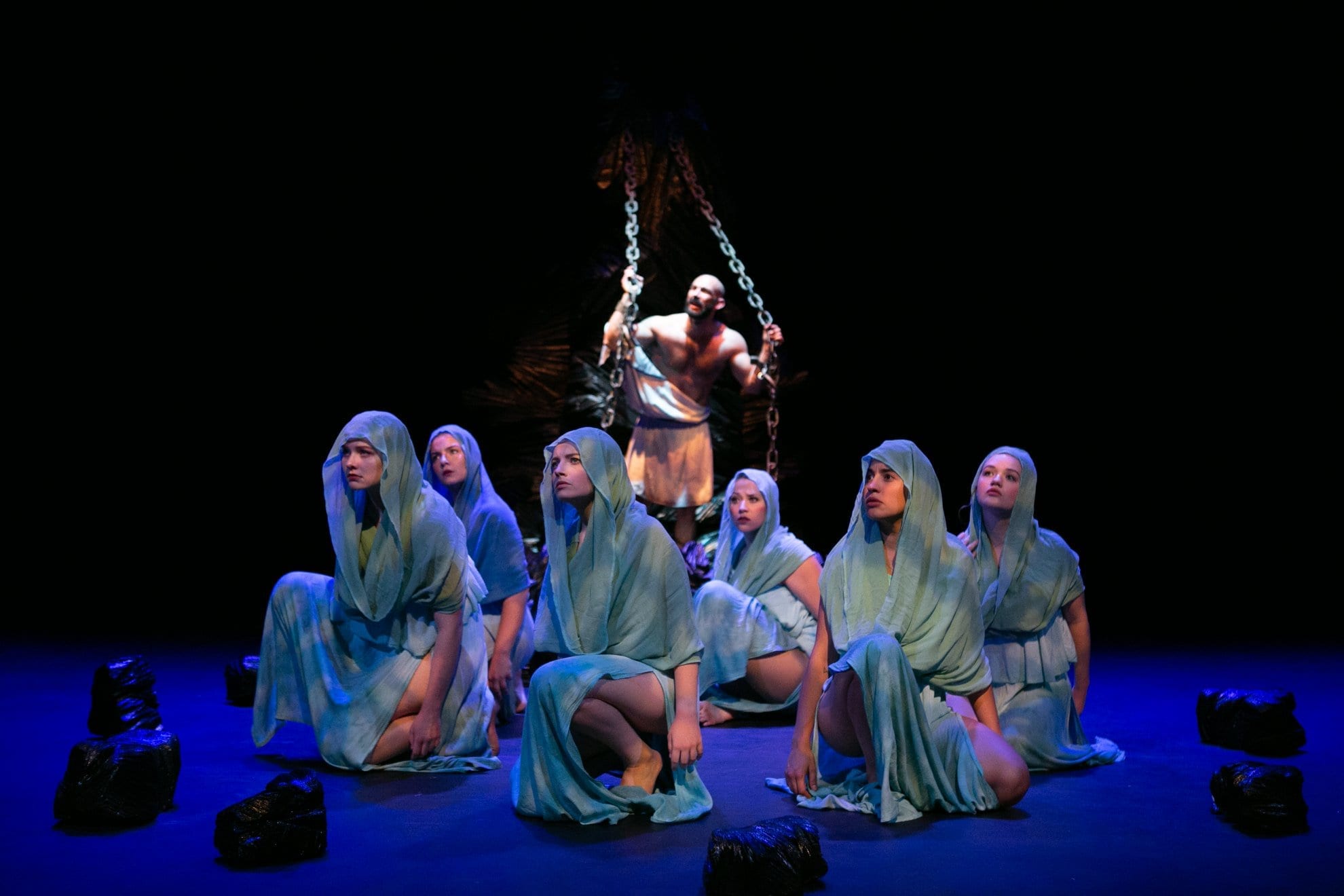SALT LAKE CITY — The Classical Greek Theatre Festival offers an excellent production of the ancient Greek tragedy Prometheus Bound, written by Aeschylus and translated by William Matthews. While the script shows its age and contains little to no action, director Emilio Casillas delivers a thoughtful, alluring, and quick paced 60 minute, no intermission interpretation of the classic.

Prometheus Bound tells the story of Prometheus “the eternal martyr” who is castigated by Zeus and consequently chained to a mountain. Zeus is enraged with Prometheus for giving the gifts of knowledge and fire to the human race that he had planned to obliterate. Prometheus and Zeus are foils to each other in that Prometheus is good and wants to enlighten mankind and use his knowledge for the better. On the other hand, Zeus is wont to abuse power and encourage the crushing of humans. The ambiguous themes of power and suffering and good and evil are exemplified in Prometheus’ speeches in excerpts such as, “For somehow this is tyranny’s disease, to trust no friends,” and “There is no sickness worse for me that words that to be kind must lie.”
Prometheus, bound in his plight, is visited by the sympathetic Naiads, a perturbed Io, and Hermes a Zeus loyalist. Through these interactions, Prometheus tells us of his journey of schooling humans, the politics that brought him to his current situation, and he also prophesies Zeus’s demise.

The set (designed by Spencer Brown) is an effective dark portrayal of a glistening mountain to which Prometheus is shackled in clunky realistic chains that loudly clink and clang as Prometheus hurls about in agony. Lighting (also by Spencer Brown) is equally as satisfying with thrilling lightening effects, cool blue tones with the softer Naiads, and deeper red tones when Prometheus is angered. Although the set never changed, the lighting cues were successfully foreshadowing the mood and action at critical points in the show.
The finest aspects of this production of Prometheus Bound were the acting and directing. Aaron Adams as Prometheus gave my favorite performance. Adams first appeared on set as a convincingly despondent Prometheus, and I enjoyed watching him show the character’s, his contemplative moods, and his anger. Adams’s eloquent diction kept me fully entranced through each of his angsty speeches throughout the play. Because of Adams, I felt Prometheus’s anguish and empathized with his quandary.
The Naiads also extended a fascinating facet to this production. As a chorus, they conversed with Prometheus and the way they quirkily moved about the set and spoke in an eerie unison added a great additional sensory appeal. I failed to notice when one of the chorus actors exited the stage and re-entered as a different character, as this was executed so seamlessly. Of Prometheus’ callers, Io (played by Carlie Young) was the most memorable presence. As Io, Young displayed an impressive agitated state throughout her time on stage, especially as Io was frantically upset. Young presented a shrill madness at times as Prometheus prophesized Io’s impending nuptials to Zeus. I truly appreciated how the space was used and how Casillas chose to create some aesthetic action and movement in a play full of speeches.
Prometheus Bound, Prometheus meaning “forethought,” is a thought-provoking play. Aeschylus wrote in a lyrical manner in which words are musical and poetic, and Matthews’s translation is faithful to the poetry of the script. Aeschylus’s play poses questions of humanity that are still relevant today. Promethues teaches lessons that still resound such as, “Time in its aging course teaches all things.” Considering the brevity, which is the soul of wit, of this production, compounded with the superb acting and directing, I would absolutely recommend seeing Prometheus Bound, especially if you are a devourer of words or a true classicist.
[box]The Classical Greek Theatre Festival’s production of Prometheus Bound plays Thursdays through Saturdays at Courage Theatre on the campus of Westminster College before performing at Weber State University (September 18), the Harman Theatre (3333 S. Decker Lake Drive, West Valley City, on September 20-21), and Brigham Young University (September 23). Tickets are $9-18 for the Westminster College performances. For more information, visit https://www.westminstercollege.edu/campus-life/events-and-performances/performing-arts-events.[/box]
